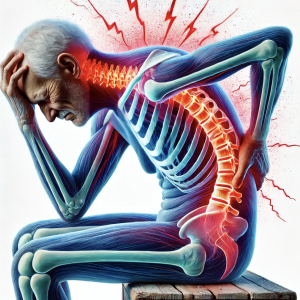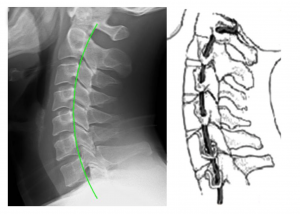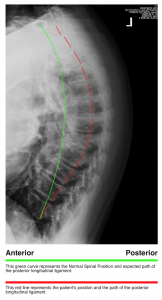Sagittal Balance

Adult Spinal Deformity
The Silent Menace
Adult Spinal Deformity Outweighs Other Chronic Conditions in Health Drama
When you think of health-related quality of life (HRQL) concerns, chronic conditions like arthritis, lung disease, diabetes, and congestive heart failure probably top your list.
But hold onto your lumbar support because Adult Spinal Deformity is here to steal the spotlight. We reveal how Adult Spinal Deformity is not just a Spinal issue – it is a Life issue.

Loss of Neck Curve Reduces Blood Flow to the Brain
Blood flow to the Brain is affected by the curve in your Neck
Decreased Vertebral Artery Haemodynamics in Patients with Loss of Cervical Lordosis.
An interesting study by Bulut MD et. al. 2016 of relevance to virtually all patients who visit a chiropractor shows a correlation between the curve in your neck and blood flow to the brain.
That is right – the correct curve in your neck allows the blood to flow to your brain in an optimal fashion.

Fibromyalgia Related to Kyphotic Posture
Impaired Trunk Posture in Women With Fibromyalgia Pain
Increased Thoracic Kyphosis and Sagittal In-Balance ==> Increased Chronic Pain
A recent paper prepared out of the University of Valencia and Miguel Hernández University, Spain has been published through PubMed by Sempere-Rubio N and Aguilar-Rodríguez M et. al.
It investigates the relationship of mid back posture, thoracic kyphosis and forward head carriage in patients with Chronic Pain and Fibromyalgia Syndromes.

The efficacy of Cervical Lordosis rehabilitation for nerve root function, pain, and segmental motion in Cervical Spondylotic Radiculopathy
PUBLISHED: PhysioTherapy 2011; 97 Supplement: 846-847. https://www.researchgate.net/publication/258226733
AUTHORS: Moustafa IM, Diab AM, Ahmed A, Harrison DE.
CONCLUSIONS: Improved lordosis in the study group was associated with significant improvements in nerve root function, VAS rating, and translational and rotational motions of the lower cervical spine.
Only in the study group were the results maintained at long-term follow up.
IMPLICATIONS: Appropriate physical rehabilitation for Cervical Spondylotic Radiculopathy should include cervical sagittal curve correction, as it is may to lead greater and longer lasting improved function.

Does improvement towards a normal Cervical Sagittal configuration aid in the management of Cervical Myofascial Pain Syndrome
PUBLISHED: BMC Musculoskelet Disord. 2018 Nov 12;19(1):396. doi: 10.1186/s12891-018-2317-y. Pub Med: https://www.ncbi.nlm.nih.gov/pubmed/30419868
AUTHORS: Moustafa IM, Diab AA, Hegazy F, Harrison DE.
CONCLUSION: The addition of the denneroll cervical orthotic to a multimodal program positively affected chronic myofascial cervical pain syndrome (CMCPS) outcomes at long term follow up.

Cervical Cord Compression and Whole-Spine Sagittal Balance
Published: World Neurosurg. 2019 Oct;130:e709-e714. doi: 10.1016/j.wneu.2019.06.198. Epub 2019 Jul 4.
Authors: Yuk CD1, Kim TH2, Park MS2, Kim SW2, Chang HG2, Kim JH1, Ahn JH1, Chang IB1, Song JH1, Oh JK3.
- Department of Neurosurgery, Hallym University Sacred Heart Hospital, Anyang, Korea.
- Department of Orthopedics, Hallym University Sacred Heart Hospital, Anyang, Korea.
- Department of Neurosurgery, Hallym University Sacred Heart Hospital, Anyang, Korea.
OBJECTIVE: We sought to investigate the relationship between cervical cord compression and factors related to whole-spine sagittal balance.
CONCLUSIONS: Cervical cord compression is more likely to develop in patients with sagittal imbalance. It is important to use whole-spine radiograph and whole-spine T2 scout magnetic resonance imaging to analyze CCI in these patients.

Cervical Cord Compression and Sagittal Balance
Nerve Damage in the Neck Related to Posture Balance
Sagittal Balance Matters For Neck Nerve Damage
A recent paper presented to World Neurosurgery, Science Direct and published through the PubMed investigates the relationship of posture and compression of the spinal cord in the neck.
As a Corrective Chiropractor, utilising postural and structural correction techniques of Chiropractic BioPhysic, this is one of many papers on PubMed, validating what we do.




